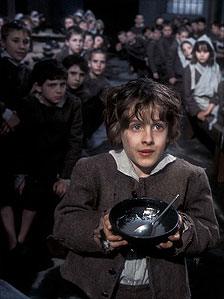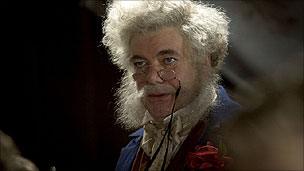Why poke fun at Charles Dickens?
- Published

Scenes from Oliver Twist are instantly recognisable
Charles Dickens is a genuine national treasure, his works read by millions and the television adaptations usually ratings hits. But his novels and characters are also ripe for satire, says Gareth Edwards.
We love Charles Dickens. The narrow fog-bound streets full of urchins; the kind-hearted impecunious clerks; the hard-hearted skinflints; Twist, Scrooge, Pickwick, all are woven into the fabric of our national subconscious.
Long before soap operas and sit-coms his novels, in their weekly or monthly instalments, had tens of thousands of fans laughing, crying and waiting for the next episode. Charles Dickens is part of the British soul.
One of the most surprising things about Dickens is that he's still funny. Humour doesn't always keep well, and while a lot of Shakespeare's jokes have passed their sell-by date, a well-crafted Dickens joke can still make us laugh out loud.
My personal favourite is in A Christmas Carol where he writes that Scrooge's large house was so out of place in its narrow street that "it must have run there when it was a young house playing at hide and seek with other houses, and forgotten its way out again".
His turns of phrase, his characters' absurdities, his comic set-pieces still have real comic life.
Part of the secret of his durability must be that each generation re-invents Charles Dickens in its own image.
BBC1's recent gritty detective drama version of Bleak House and the same channel's scandal and debt-strewn Little Dorrit tell us as much about the 21st Century as the 19th.
Similarly, Roman Polanski's 2005 Oliver features the hanging of a troubled, victimised Fagin and the mental scarring of the abused Artful Dodger, when 40 years earlier both of them got to dance off into the sunset in the more innocent 60s musical. Time and again we re-discover him, and find that he has something particular to say to us.
That's because Dickens wrote about ordinary human lives faced by extremes. Extremes of poverty; extremes of cruelty; extremes of harshness. He was drawn to the subject because he felt he lived in a time of extremes and this made him anxious because he was above all a fundamentalist moderate.
He wanted people to have the space to live their lives away from the crushing forces of greed, selfishness and dogma. He wasn't opposed to any one form of government, or any one social injustice.
He was opposed to inhumanity, and this is invariably the target of his satire. Dickens is on our side, laughing with us at the inhumane, the faceless, the authoritarian, and it makes us warm to him time and again.
But while we love him for that, being opposed to inhumanity isn't a particularly risky position for a novelist, and from the moment people began to laugh with Dickens they have also been laughing at him.
Uncle Charlie
His contemporary Anthony Trollope nicknamed him Mr Popular Sentiment - "a very powerful man, and perhaps not the less so that his good poor people are so very good; his hard rich people so very hard".
Oscar Wilde wrote of The Old Curiosity Shop that "one must have a heart of stone to read the death of little Nell without laughing".

Some characters are ripe for caricature
Over the years everyone from Lenin to The Muppets have had a laugh at Dickens' expense, and Radio 4's Bleak Expectations is the latest in that long tradition. Just as Dickens gets reinvented by each new generation, so each new generation feels the urge to find a new way to have a bit of a go at him.
But while a work like Bleak Expectations seemingly takes delight in dismantling that cosy Dickensian world, it also takes delight in inhabiting it.
The streets and homes of Dickens's world are so familiar to us, its ways so reassuring, that to joke about it feels like joking about a friendly uncle. It's a laughter full of affection, as if while we are laughing at him, we feel Dickens himself might very well enjoy the joke too.
Maybe Dickens would enjoy the fact that we don't see him as a sour-faced monolithic cultural institution. We see him as member of the family, someone who might enjoy not being taken too seriously.
And maybe that's a part of why we still love Dickens - because we know Dickens loves us enough not to begrudge us a laugh at his expense.
Gareth Edwards is a comedy producer for BBC Radio